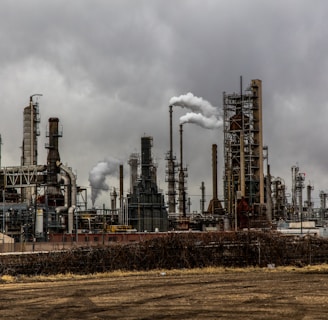Understanding Climate Change: Science, Impacts, and Solutions
6/3/20252 min read


Understanding Climate Change: Science, Impacts, and Solutions
Climate change. The words themselves evoke a mix of anxiety, urgency, and perhaps, for some, a healthy dose of skepticism. But beyond the headlines and political rhetoric, lies a complex scientific reality with far-reaching consequences for our planet and its inhabitants. This isn't just about warmer summers; it's about fundamental shifts in our global systems and the very future we are building. In this post, we'll delve into the science underpinning climate change, explore its devastating impacts, and critically examine the solutions needed to avert the worst-case scenarios.
The scientific consensus on climate change is overwhelming. Decades of meticulous research, data collection, and rigorous peer review have solidified the understanding that the Earth's climate is warming at an unprecedented rate, and that human activities are the primary driver. This warming is primarily due to the increased concentration of greenhouse gases (GHGs) in the atmosphere, such as carbon dioxide, methane, and nitrous oxide. These gases trap heat, preventing it from escaping back into space, thus raising the planet's average temperature. The primary culprit in this GHG buildup is the burning of fossil fuels – coal, oil, and natural gas – for energy production, transportation, and industrial processes. Deforestation, agriculture, and certain industrial activities also contribute significantly. Understanding this basic mechanism is crucial for grasping the magnitude and urgency of the problem.
The impacts of climate change are already being felt worldwide. From more frequent and intense heatwaves to rising sea levels, the consequences are becoming increasingly visible and impactful. Coastal communities are facing the threat of inundation, while agricultural regions are experiencing more severe droughts and floods, leading to food insecurity. Extreme weather events, such as hurricanes, wildfires, and floods, are becoming more common and devastating, displacing populations and causing significant economic damage. The delicate balance of ecosystems is being disrupted, leading to biodiversity loss and the extinction of species. Furthermore, climate change exacerbates existing inequalities, disproportionately impacting vulnerable populations who are least equipped to adapt to its effects. Ignoring these impacts is not an option; we must understand the present realities to prepare for the future.
Addressing climate change requires a multifaceted approach that encompasses mitigation, adaptation, and innovation. Mitigation involves reducing GHG emissions through transitioning to renewable energy sources like solar, wind, and hydro power. Improving energy efficiency in buildings, transportation, and industry is also essential. Furthermore, embracing sustainable agriculture practices and reforestation efforts can help sequester carbon dioxide from the atmosphere. Adaptation, on the other hand, focuses on building resilience to the effects of climate change that are already unavoidable. This includes developing drought-resistant crops, constructing seawalls, and creating emergency preparedness plans for extreme weather events. Finally, innovation is crucial for developing breakthrough technologies, such as carbon capture and storage, and sustainable aviation fuels, that can accelerate the transition to a low-carbon economy.
Ultimately, tackling climate change requires global cooperation, political will, and individual action. Governments must implement policies that incentivize emissions reductions, promote renewable energy, and support climate research. Businesses need to embrace sustainable practices and invest in clean technologies. And individuals can make a difference by reducing their carbon footprint, supporting climate-friendly policies, and advocating for change. The challenge is immense, but the stakes are even higher. By understanding the science, acknowledging the impacts, and embracing the solutions, we can work together to create a more sustainable and resilient future for generations to come.
Thought-Provoking Questions:
What role do you think technology will play in combating climate change? Are there any specific innovations you find particularly promising?
How can we ensure that climate action is equitable and doesn't disproportionately burden vulnerable communities?
What are some small but significant changes you can make in your daily life to reduce your environmental impact?
Explore deep insights on current events and growth.
Vision
Truth
hello@insightoutvision.com
+1-2236036419
© 2025. All rights reserved.
